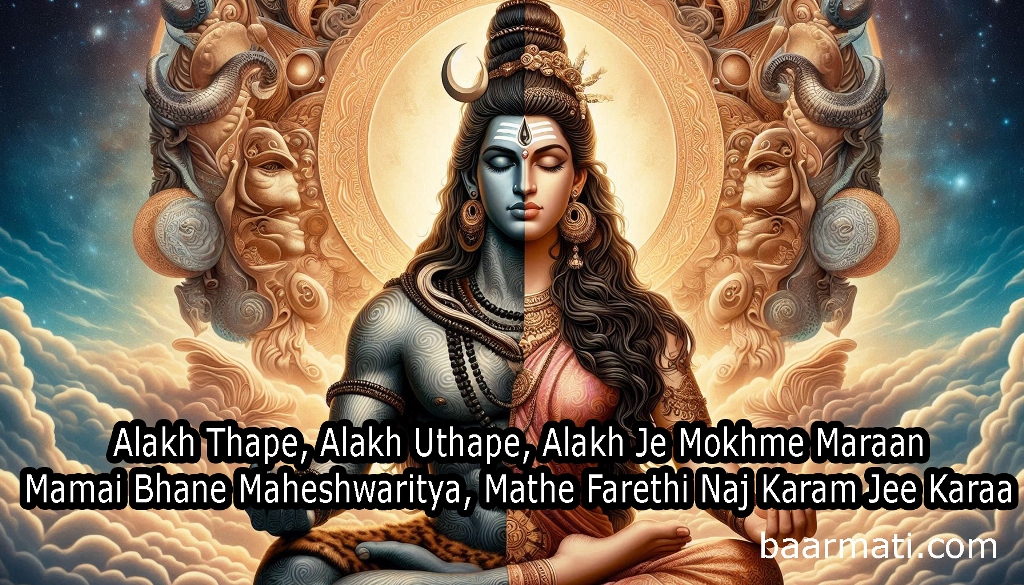In the rich tapestry of Baarmati religion, the Almighty God known as Alakh, Alakhdev, or Karam Dev holds a central and revered position. This divine entity embodies a dual essence, combining masculine and feminine energies. Therefore, it’s hard to associate any specific gender to him. However, we will use the pronoun “him” for this article, as it is generally accepted. Alakhdev is celebrated as the all-knowing, all-powerful, and benevolent creator of everything that exists. His influence extends far beyond the boundaries of Baarmati belief, reaching into the realms of Hinduism, Abrahamic religions, and other faiths under different names. As they carry out his divine will, avatars and messengers are regarded in Hinduism as incarnations of Alakhdev himself, representing his will and power.
The Divine Attributes of Alakhdev
Alakhdev is not just a singular deity but a harmonious blend of dual energies, reflecting both masculine and feminine aspects. This duality symbolises the balance and unity inherent in the cosmos, representing the idea that creation and existence result from this harmonious interaction. As the all-knowing and all-powerful creator, Alakhdev’s kindness permeates through his actions and creations, guiding and nurturing life across the universe. The half-man and half-woman Shiva, or Ardhnari Swaroop, represents this energy. In the important ritual known as “Karam Baarai,” followers of Baarmati religion believe that the “Maishar,” a person performing the ritual, embodies the Ardhnari Swaroop. The ritual “Karam Barai” represents a future event that will happen in the upcoming Panchorath Yug, when 36 crore divine souls will gain immortal and powerful bodies. Through these bodies, they will be able to visit the “Ujaas Pod” (21st Universe or Heaven), where Almighty Alakhdev resides in the form of dual energy as half-man and half-woman Shiva, or Ardhnari Swaroop, where they will worship him and he will keep them there with him.
The Path to Alakhdev’s Powers
In Baarmati religion, it is believed that avatars in Hinduism and messengers in Abrahamic religions are expressions of Alakhdev’s divine will. These figures attain their status not merely through divine selection but through their righteousness, good deeds, and accumulation of positive karma. This path to divinity is not exclusive to avatars and messengers; it is accessible to any individual who lives a virtuous life. By adhering to the principles of righteousness and performing good deeds, even ordinary beings can achieve a connection to Alakhdev’s power. For example, Lord Shiva or Shree Dhani Matang Dev were normal beings initially, but they achieved Alakhdev’s power by understanding him early in the beginning of the religion. They lived righteous lives in every rebirth or reincarnation and made many sacrifices for the betterment of mankind. They faced numerous challenges while possessing Alakhdev’s divine power in their reincarnations, including as Ram Avatar, Krishna Avatar, Imam Ali, and Shree Dhani Matang Dev.
Alakhdev’s Influence Across Religions
The concept of Alakhdev transcends religious boundaries, illustrating the universal nature of their influence. In Hinduism, avatars such as Rama and Krishna are considered incarnations of the divine, embodying different aspects of Alakhdev’s power and purpose. Similarly, in Abrahamic religions, messengers and prophets, including figures like Moses and Muhammad, are seen as channels through which Alakhdev’s guidance reaches humanity. These avatars and messengers serve as bridges between the divine and the mortal, embodying Alakhdev’s attributes and will in human form. All things since the beginning of time have been created by a single entity, as commonly mentioned in every religious text. Still, many misunderstandings have been created through manipulation for personal interests.
The Significance of Dual Energy
The dual energy of Alakhdev, merging masculine and feminine elements, is a profound aspect of Baarmati belief. This duality is not only a reflection of the balance within the universe but also an invitation for individuals to seek harmony within themselves. By recognising and embracing both aspects of their nature, followers of the Baarmati religion strive to align themselves with the divine, fostering a deeper connection to Alakhdev. This dual energy is present in both men and women and helps us understand the emotions of the opposite gender or, specifically, our partners.
Conclusion
Alakhdev stands as a testament to the universal and inclusive nature of divinity within the Baarmati religion. Through the harmonious blend of dual energies, the Almighty guides and nurtures creation, offering a path to divine power for all who live righteously. By exploring Alakhdev’s influence across different religions and the potential for all beings to connect with the divine, we gain a deeper understanding of the spiritual richness and diversity of the Baarmati faith.
